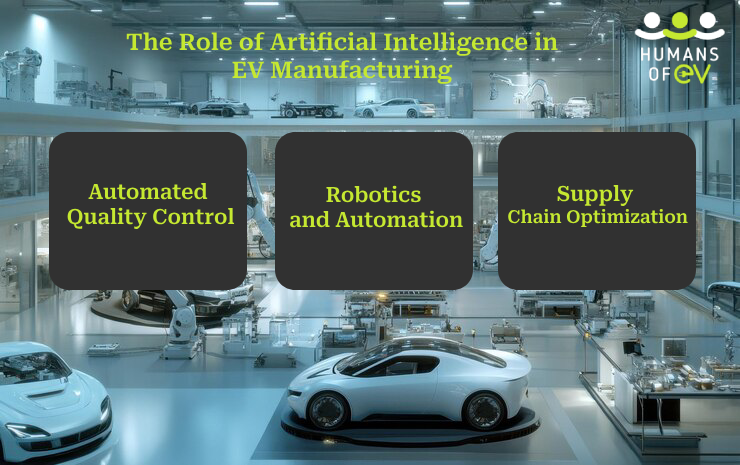
The Role of Artificial Intelligence in EV Manufacturing
Home » The Role of Artificial Intelligence in EV Manufacturing
Table of Contents

Read More
-
Garaaz Secures ₹4.55 Crore Seed Funding to Transform India’s Auto Parts Aftermarket
-
Indofast and Motovolt Unveil Battery-Swappable Electric Scooter to Slash EV Costs and Boost Adoption
-
Ganesh Mani S Takes the Helm as CEO of Switch Mobility India: Ushering in a New Era for Electric Commercial Vehicles
-
AM Green Acquires 17.5% Stake in Greenko Energy Holdings from ORIX in Landmark $1.4 Billion Green Energy Deal
-
Ather Energy Unveils Battery-as-a-Service, Affordable Scooters, and Aggressive Expansion to Challenge EV Market Leaders

The electric vehicle (EV) industry is rapidly evolving, with manufacturers constantly seeking ways to enhance efficiency, reduce costs, and improve product quality. One of the most significant advancements in this space is the integration of artificial intelligence (AI) into the manufacturing process. AI is transforming how EVs are designed, produced, and even maintained, offering unprecedented opportunities for innovation and growth. This article explores the various ways AI is revolutionizing EV manufacturing and the impact it is having on the industry.
AI in EV Design and Development
AI plays a crucial role in the design phase of EVs, enabling manufacturers to create more efficient and innovative vehicles. By using AI-driven simulations and predictive analytics, engineers can optimize vehicle designs for aerodynamics, energy efficiency, and safety. AI algorithms analyze vast amounts of data from previous designs and real-world driving conditions to predict the performance of new models, allowing manufacturers to make data-driven decisions.
Key Applications in Design
1. Generative Design: AI-powered generative design tools can create multiple design options based on specific criteria, such as weight reduction or material efficiency. This allows designers to explore innovative solutions that might not have been considered through traditional design methods.
2. Predictive Maintenance: AI algorithms can predict potential issues in vehicle components before they occur, allowing manufacturers to address them during the design phase. This proactive approach reduces the likelihood of costly recalls and improves vehicle reliability.
AI in the Manufacturing Process
AI is also transforming the manufacturing process itself, making production lines more efficient and reducing operational costs. From automated quality control to predictive maintenance of machinery, AI-driven solutions are optimizing every aspect of EV production.
Key Applications in Manufacturing
1. Automated Quality Control: AI-powered vision systems can inspect vehicle components at every stage of production, identifying defects with a level of precision that far exceeds human capabilities. This ensures that only high-quality parts are used in the final assembly, reducing waste and improving overall product quality.
2. Robotics and Automation: AI-driven robots are becoming increasingly common on the production floor. These robots can perform complex tasks with high precision, such as welding, painting, and assembling components. AI algorithms optimize their movements, reducing cycle times and increasing productivity.
3. Supply Chain Optimization: AI is revolutionizing supply chain management by predicting demand, optimizing inventory levels, and identifying potential disruptions. This allows manufacturers to respond quickly to changes in the market and ensure a steady supply of materials and components.
AI in Post-Production and Maintenance
AI’s impact on the EV industry extends beyond the manufacturing process. In post-production, AI plays a key role in vehicle maintenance and customer service, enhancing the overall ownership experience for consumers.
Key Applications in Post-Production
1. Predictive Maintenance: AI-driven analytics can monitor the health of critical vehicle components in real-time, predicting when maintenance is required. This reduces the likelihood of breakdowns and extends the lifespan of the vehicle.
2. Personalized Customer Experience: AI-powered chatbots and virtual assistants provide personalized support to EV owners, answering questions, scheduling maintenance appointments, and even diagnosing issues remotely. This enhances customer satisfaction and builds brand loyalty.
Challenges in Implementing AI in EV Manufacturing
While the benefits of AI in EV manufacturing are clear, implementing these technologies comes with its own set of challenges. Companies must invest in the necessary infrastructure, including data collection and storage, AI software, and skilled personnel to manage these systems.
Key Challenges
1. High Initial Costs: The integration of AI into manufacturing processes requires significant upfront investment in technology and training. This can be a barrier for smaller companies with limited resources.
2. Data Security: As AI relies heavily on data, ensuring the security of this data is paramount. Manufacturers must implement robust cybersecurity measures to protect sensitive information from potential breaches.
3. Workforce Adaptation: The adoption of AI-driven systems may require a shift in the workforce, with a need for new skills and expertise. Companies must invest in training programs to ensure their employees can effectively work with AI technologies.
Case Studies: AI in Action
1. Tesla: Tesla is a pioneer in using AI across its manufacturing process. The company uses AI-driven robots for assembly and quality control, while its vehicles are equipped with AI-powered systems for autonomous driving and predictive maintenance.
2. Mahindra Electric: Mahindra Electric, one of India’s leading EV manufacturers, has integrated AI into its design and production processes. The company uses AI to optimize vehicle design for energy efficiency and to streamline its production lines.
3. Ola Electric: Ola Electric is leveraging AI to enhance its manufacturing capabilities in its new EV plant in Tamil Nadu. The facility uses AI-driven automation to produce electric scooters at scale, ensuring high quality and efficiency.
Conclusion
AI is set to play an increasingly important role in the EV industry, driving innovation and efficiency across the board. From design and manufacturing to post-production and maintenance, AI offers numerous opportunities to enhance the quality and performance of electric vehicles. However, the successful integration of AI requires significant investment and careful planning to overcome the associated challenges. As the industry continues to evolve, companies that embrace AI will be well-positioned to lead the way in the next generation of electric vehicles.



